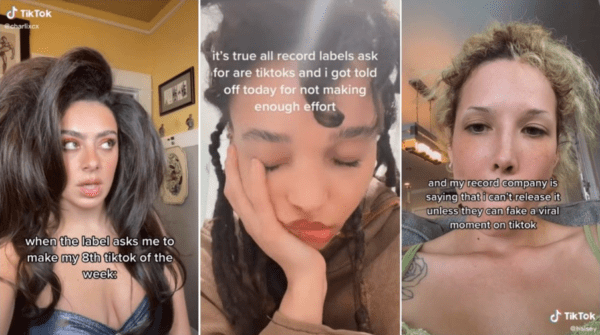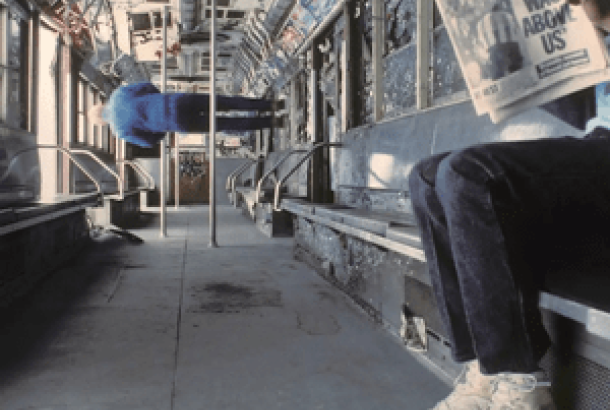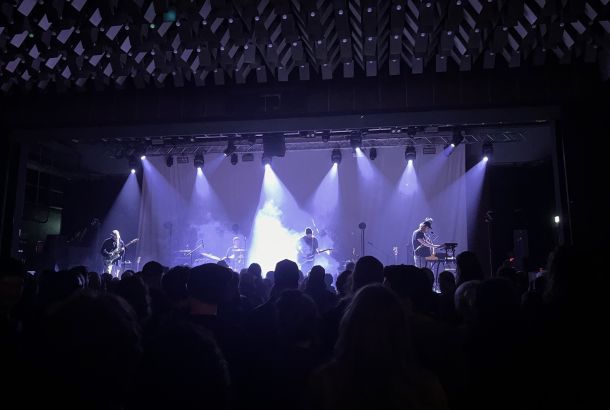Does Length Matter? A dive into the modern music industry

Spotify has told bands that they need to release every month minimum to fit the algorithm. You’d think being controlled by TikTok and their algorithms is pressurising enough, but artists now must consider streaming services too. The music industry is being dictated by algorithms, which begs the questions: at what point can artists rebel? Will they have the means to rebel? Is their creativity being capped? And is there hope?
Whilst this article may come across as somewhat depressing, it’s not completely – I spoke to The Snuts in March, and later in 2022 the boys ran a successful social media campaign to persuade their label Parlophone Records to release their album early.

This is an example of the potential for artists to rebel, but it’s worth noting that The Snuts can afford to do this – 112k Instagram followers, 918,364 monthly Spotify listens – the boys have a pretty secure fanbase.
According to Musician Wave, the average length of a track has decreased by 40 seconds since 2014. Not only is the overall length of a song being reduced, but the composition of a track is being controlled. If we look at the start of a track, artists previously had the option to have long instrumental introductions. How many times have you heard a long introduction in recent releases?
Artists don’t have the flexibility to incorporate this anymore, not if they want to be picked up by streaming algorithms or TikTok trending sounds. Lyrics at the start of a track are pretty much vital nowadays. With an instrumental introduction of 52 seconds, I wonder how Led Zeppelin’s ‘Stairway to Heaven’ would be received today. Is the attention economy and shortening concentration of our society a good or bad thing for the industry?
Could we go as far as questioning the intent behind tracks: has it gone so far that artists are making songs (or being forced by society/labels/managers/fans) with the specific intent for TikTok? The intent to have a great loop that goes viral; almost a backwards way of writing to match the algorithms.
Now this is in relation to tracks, but in turn this leads to shorter albums – are albums still important in the music industry? Previously a consumer could sit with an album and listen to the story and the emotions the artist is conveying. People would respect the record and the work that goes into the creation of it. They’d wait patiently – or not, it doesn’t matter – but they’d wait with respect for the artist and excitement for the record, and that’s what does matter.
And whilst not all music consumers are die hard music fans, either way it’s how humans consume music. Today, we are demanding so much more because we are used to consuming constantly. We consume every day, multiple times a day, in many different forms of media: on different sites, devices; online, offline – you get the gist, and naturally this has been reflected into and onto the music industry.
If we compare some 2022 album to a release from the 90s there is a vast difference. Back in 1993 (not that I was even alive), Blur released Modern Life Is Rubbish, having only released one single beforehand (‘For Tomorrow’) out of 14 album tracks.
The Snuts‘ Burn The Empire released four singles of the 11 songs.
Alfie Templeman’s Mellow Moon had four of 14 released prior.
Sport’s Team’s Gulp! released five of 10 beforehand.
The Kooks latest album 10 Tracks to Echo in the Dark released two EPs (both three tracks long) beforehand, so only four tracks were new.
But this shift is actually quite recent. Arctic Monkey’s 2022 The Car released 3/10 singles beforehand. Whereas 2018’s Tranquillity Base Hotel & Casino released zero of 11 beforehand.
So nowadays, because the industry is being dictated by algorithms and society’s consumption, artists are having to release almost half of their album or EP in advance. Alfie Templeman said that releasing singles in advance “does kinda kill off the album” and whilst during our discussion we understood the strategy from the label and managers’ perspective, we both agreed that we didn’t like it and it “ruined the record”.
Artists are putting a lot of work, creativity, emotion, and energy into their record, and so it is “unfortunate and upsetting” that they now are no longer able to keep their work and art so close to them; it’s out of their control as to how they wish to release it. Labels are businesses, and businesses need deadlines, but you can’t put a timeline on creativity – well you shouldn’t.
I know this will be a controversial opinion, but I don’t like Harry’s House. I don’t like it as an album – yes, they are good songs, and at one point 13 songs of the top 30 in Billboard Top 100 were tracks from Harry’s House, but I couldn’t and didn’t connect with the album. It felt disorganised and messy – just like my ADHD brain. Don’t get me wrong, it’s a great selection of songs, but it doesn’t feel like an album. But then again, what is an album nowadays?
An album doesn’t have to be conceptual to be good, but it certainly makes it better. Another example is the album Divide. In 2017, Ed Sheeran was the first artist to achieve 10 out of 10 in the UK Official Top Charts. All top ten tracks were from his album – Divide.
What I’m trying to say is I feel like albums as a concept have lost the meaning they once had, and without Adele, albums would still be getting shuffled – further proving my point that consumers no longer care about the order and story an artist is telling through an album. Now it’s just two minutes of (catchy) noise.
Once upon a time an album could tell a story, a story that the artist wanted to explore and share with the world. Nowadays, this story must be told within minutes, as consumers want and demand the same depth of an album within a track. Of course, some artists still release astonishingly conceptual albums (Arctic Monkey’s The Car, Loyle Carner’s hugo, Kendrick Lamar’s Mr Morale and the Big Steppers, Fontaines D.C.’s Skinty Fia), however these artists are huge and have an established reputation – they can no longer be bullied by labels into a specific sound or genre because that is what’s ‘in’.
Or better yet, they even want it within a thirty second snippet that they can use as their ‘day in the life’ ‘get ready with me (grwm)’ or ‘#fit check’ TikTok’s (no shade, I’ve done both of those types of TikToks). But the point still stands that artists are becoming more and more restricted.
Not only are artists being forced into becoming content creators, they have further requirements and pressure to relentlessly create new tunes to release for consumers, and to please the algorithms of streaming services.

Reels, TikTok, consumption, everything I’ve mentioned is all in relation to the attention economy. In 2000 our attention span was 12 seconds, in 2015 it had significantly decreased to just 8.25 seconds – a drop by 25%. The attention economy is something I spoke in detail about with The Snuts following the release of their track ‘Zuckerpunch’. The shortening attention span is not solely a player in the music industry, but a much greater concern to society and the arts/culture world.
It’s not solely TikTok that we should look at when considering what limits artists and their creativity and their freedom. TikTok, as we know, and as many publications and articles have explored, limits artists as they are required to be content creators as well as musicians, and of course shortens our attention span. Streaming services are also to blame, with the constant need to release music, update profiles, and manipulate the algorithms to work in their benefit. Artists are being controlled and their creativity is limited.
Do artists have the flexibility they once did? Do artists have the creativity they deserve? There still is some spontaneity and mystery in the industry. Mercury nominated Little Simz released NO THANK YOU on December 12 2022, announcing the release just six days beforehand with a typing reel on Instagram, and a post with the album cover and track titles just two days before.
Although, having said this, she is totally independent and so does not have the pressure of labels – but this is not all positive as she had to cancel her US Tour on the basis of being unable to finance it. To be a rebel is courageous, and it is brave not to conform, but not everyone has the luxury of being able to do this.
The artists who perhaps only announce an album a month before or continue to only release tracks on their terms have the privilege of already having a strong fanbase and a reputation in the industry. They are already established and so have the flexibility to be creative and not succumb to the pressure of the industry.
For example, SZA posted an ambiguous photo, album cover in fact, with no caption on the November 20 2022, and the album SOS was released December 9 2022. This is another example of rebelling against the status quo of how the industry runs nowadays. SZA is signed to RCA Records but because she’s established with a loyal fanbase, she has more control and power over her music than up and coming bands.

With emerging artists, those trying to make their mark on the industry, those who are consistently trying to prove themselves, they are being dictated by this constant consumption and entitlement from consumers who believe they deserve new music every month.
However, artists are still getting picked up and albums are still being released. Alessi Rose made it to number 10 of the BBC Introducing’s most played artists, despite having never released a track, and albums do still get hype. It just varies based on how established an artist already is.
Neil Young removed himself off Spotify streaming services in 2020 due to ‘The Joe Rogan Experience’ podcast spreading misinformation about Covid-19. Joni Mitchell and other artist followed in his footsteps, with a campaign #DeleteSpotify being born. Leaving Spotify meant that he would lose 60% of worldwide streaming income; however, Young has the luxury of being able to do this, unlike newer artists.
My concluding statements are the industry is rough, and I have no doubt these thoughts will be outdated by this time next year. The pace of not just the industry, but society is wild – it’s no surprise being stressed is part of my personality. Best of luck to those trying to ‘make it’, it’s going to be one hell of a journey and I’m excited to watch how the industry and artists manoeuvre over the next few years.







